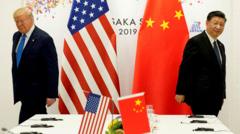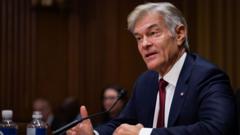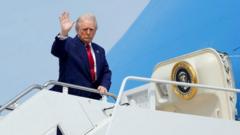President Trump’s tariffs and military spending demands have strained the trans-Atlantic alliance, suggesting a significant shift in U.S.-European relations that could persist, even as earlier administrations sought solidarity against adversarial forces.
The Evolving Dynamics of the Trans-Atlantic Alliance Under Trump's Tariff Policies

The Evolving Dynamics of the Trans-Atlantic Alliance Under Trump's Tariff Policies
An analysis of President Trump’s tariff policies that impact relations with Europe and NATO allies, emphasizing the fractured diplomatic ties over time.
President Trump's approach to foreign policy has often been marked by antagonism towards longtime allies, particularly in Europe. While previous leaders, such as President Joseph R. Biden Jr., have rallied these nations against common threats, notably the Russian invasion of Ukraine, Trump's stance diverges sharply. He perceives European partners not as allies but as economic challengers. Recently, he expanded tariffs on several countries, including Ukraine, yet notably exempted Russia and North Korea from these trade measures.
This unilateral approach to tariffs risks fracturing a relationship that has been foundational to European peace and stability for nearly eight decades. Economists like Guntram Wolff, from the German Council on Foreign Relations, assert that these tariffs bolster perceptions of the U.S. as an unreliable partner, potentially dismantling the cooperative framework that has historically defined trans-Atlantic relations.
Further compounding these tensions are Trump's demands that NATO allies increase military spending to as much as 5% of their GDP—an aggressive position that echoes his earlier contentious remarks concerning the territorial sovereignty of allied nations like Denmark. Observers note that such actions not only risk geopolitical stability in Europe but may also inadvertently aid adversaries such as Russia by undermining their opposition on the continent, despite recent fluctuations in oil prices that also affect the Kremlin.
The evolving dynamics encapsulated by Trump's trade policies reflect a broader shift in global relations, indicating potential long-term consequences for U.S. foreign policy and its alliances. As Europe grapples with these changes, the future of its relationships with America remains uncertain, characterized by a growing disconnect that may be challenging to repair.





















